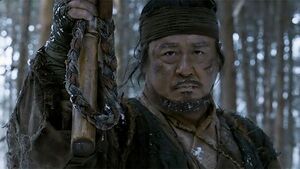Jang Iseul
Jang Iseul | |
|---|---|
 | |
| Native name | 장이슬 |
| Born | 14 February 1890 Ikchaek, Gyerje Province, Joyonghean Empire |
| Died | 5 October 1988 (aged 98) Sundong, Chungcheong Province, Joyonghean |
| Allegiance | |
| Branch | |
| Years of service |
|
| Rank | |
| Battles/wars | |
| Relations |
|
| Other work | Author |
Jang Iseul (14 February 1895 – 5 October 1988) was a Joyonghean military officer, traveler, and spy. He became a celebrated figure throughout Joyonghea, and is known for his memoir Adventures and Espionage Beyond: The Experiences of a Military Officer and Spy.
Iseul was born in Ikchaek in Central Joyonghea to farmers. He was commissioned Second Lieutenant in 1911 after graduating from the Dongnae Imperial Army Academy. He first served in the Whiteford Islands Uprising in 1912, and his experiences with the rebels inspired him to pursue intelligence gathering alongside combat. He then served with distinction during the Jeongsa War alongside his friends Hwangbo Man-shik and Mun Baek-hyeon. During the Second Auro-Quenminese War, he served as a military advisor to the Aurucolian Army in Taoyuan. With the Great Eastern Rivalry escalating, Iseul was assigned with gathering intelligence through East and South Asianna, taking him as far as Lorica, Sarkoros, and Tibetia. In 1934, he was discharged for alleged bad conduct when he tried to present evidence of a looming Quenminese invasion of Jurchenia and Northwest Joyonghea, made probable with his alcoholism. During the Third Joyonghean-Quenminese War, he kept himself within covert operations on his volition, allying himself with resistance pockets, until his discovery in the mountains by the Special Operations Executive's Torch Company in January 1944. After much persuasion with promises of an honorable discharge, Iseul was reinstated in the Army. Alongside his actions in the Joyonghean mainland, he also played a major role in the de-stabilization of Quenminese military presence in Lorica and Tibetia, and the Imperial pockets of resistance during the Post Second Europan War Crisis of 1945. He retired as Major General in 1950 months before the War of Lorican Aggression. He became an instructor during the latter, and an author, and returned to farming until his death in 5 October 1988.